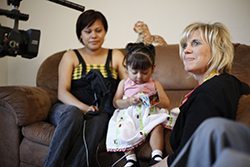PACER Explains the Individualized Education Program for Your Child With Complex Medical Needs

Today, we’re honored to share a guest post from the PACER Center – an organization who helps so many of our patient families. PACER Center enhances the quality of life and expands opportunities for children, youth, and young adults with all disabilities and their families so each person can reach his or her highest potential. PACER operates on the principles of parents helping parents, supporting families, promoting a safe environment for all children, and working in collaboration with others.
For students with complex medical needs, their ability to learn and function at school can be affected by medications, treatments, therapies, or hospitalizations. As the new school year begins, it’s important for parents to feel confident that their child is receiving appropriate services.
“One of the most common questions we are asked is ‘How do I know my child is getting all the services he has a right to?’ For parents of children with medical complexities, there can be a heightened concern,” said Vava Guthrie, a senior parent advocate at PACER Center. “What’s important to know is that schools aren’t required to provide services unless there is a documented need, determined by an evaluation, which affects their child’s educational success. Needs drive services.”
An alphabet soup of student rights
Under the Individuals with Disabilities Education Act (IDEA), all qualifying children with disabilities are entitled to a free and appropriate public education (FAPE). When a health condition impacts a child’s learning, he or she may be eligible to receive special education support and services.
 In order for a student to receive special education services, a special education evaluation must be completed by the school district. Minnesota state rules set eligibility requirements for students with other health disabilities (OHD). An Individualized Education Program (IEP) is written if the child is found to have met the criteria.
In order for a student to receive special education services, a special education evaluation must be completed by the school district. Minnesota state rules set eligibility requirements for students with other health disabilities (OHD). An Individualized Education Program (IEP) is written if the child is found to have met the criteria.
It’s important for a parent to review the IEP at the beginning of the school year, particularly if their child’s condition has changed, to ensure that the student continues to make adequate educational progress. IEP reevaluations typically take place every three years, but parents can request an evaluation at any time if they think there is a need that is not documented.
Understanding your child’s unique needs
The Minnesota Department of Education (MDE) has also prepared information sheets for educators about the implications of several conditions and how they can affect a child at school.
For example, a student who has asthma may need to take medication throughout the day and make special accommodations for extended absences, but they may not need specialized instruction through an IEP. A 504 Plan or individual health plan may be appropriate. A student with a genetic disorder that impairs their cognitive ability or motor function, however, may require specialized instruction and related services through an IEP in order to receive a free and appropriate education.
 Wendy Ringer, coordinator of PACER’s Health Information Center, suggests including a home care nurse, appropriate medical providers, and the school nurse on the IEP team if possible. She encourages parents to share any medical information that would help the student receive appropriate services.
Wendy Ringer, coordinator of PACER’s Health Information Center, suggests including a home care nurse, appropriate medical providers, and the school nurse on the IEP team if possible. She encourages parents to share any medical information that would help the student receive appropriate services.
“It’s important for families who have children with medically complex needs to work closely with the school nurse,” Ringer said. “Not only can the nurse be a strong advocate for your child, they have the expertise to identify and recommend appropriate accommodations and interventions to facilitate full access to educational programs.”
Find more resources at PACER
PACER, a Parent Center for families of children and young adults with any disability and health needs, offers many tools and resources to help in creating or reviewing a child’s IEP. Among the tools is “From Needs to Services: Parent Homework Sheet,” which helps parents determine if the goals and support listed in the IEP match the needs listed in the child’s Evaluation Summary Report completed by the school.
 PACER also offers a variety of workshops that are free to parents in Minnesota. One of the most popular workshops is “Hot Tips on the Individualized Education Program: Is Your Child’s IEP Individualized and Appropriate?” Upcoming sessions will take place on Oct. 10 in Waseca, and on Nov. 29 at PACER Center, 8161 Normandale Blvd. in Bloomington.
PACER also offers a variety of workshops that are free to parents in Minnesota. One of the most popular workshops is “Hot Tips on the Individualized Education Program: Is Your Child’s IEP Individualized and Appropriate?” Upcoming sessions will take place on Oct. 10 in Waseca, and on Nov. 29 at PACER Center, 8161 Normandale Blvd. in Bloomington.
For more information about PACER or its Health Information Center, call 952-838-9000 or 800-537-2237 (toll-free), or visit PACER.org. Parents can also sign up on the website for a free newsletter.
Originally published: October 5, 2016


I am a parent from New York, with a medically complex child. I’m looking for resources and trying to learn my son’s rights to attend school while accommodating his condition. I will cannot let his health condition affect his education, especially since he already has an IEP in place. However, his illness has become more complicated and will need to be on daily IV fluid which is carried in a mini backpack so he can continue on with his day. Is there a center similar to yours in New York that you can refer me to?
I was recommended this website by my cousin.
I’m not sure whether this post is written by him as no one else know such detailed
about my trouble. You’re amazing! Thanks!